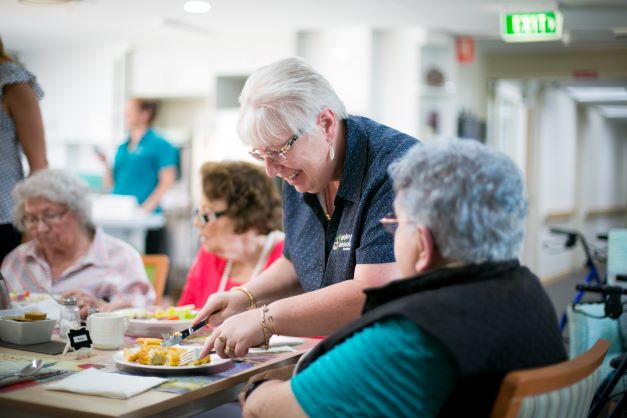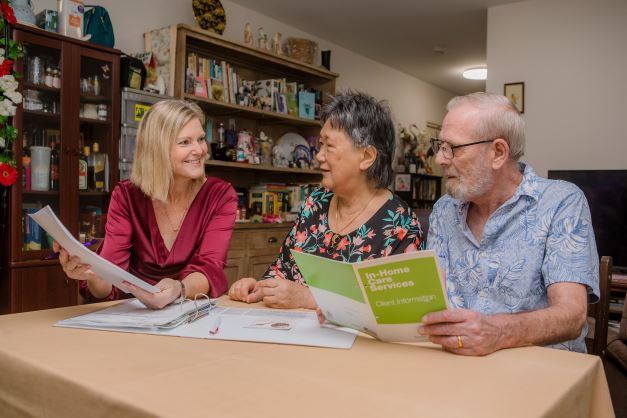The ACAT assessment facilitates access to government-funded aged care services, such as Home Care Packages, residential aged care homes, short-term accommodation and respite care. This comprehensive evaluation process helps tailor personalized care plans best suited to individuals' unique circumstances.
Call now 1800 448 448. Our warm and friendly Aged Care Specialists are waiting to chat with you. Don't wait, connect today!

The ACAT assessment is a comprehensive evaluation conducted by the Australian government organisation 'My Aged Care' to determine an individual's eligibility for government-funded aged care services. It aims to ensure that individuals receive the most appropriate and tailored care based on their assessed needs.
To check your eligibility for an assessment, you (or your carer) can:
If eligible for subsidised aged care, My Aged Care website will prompt you to apply online for an assessment.
To apply for an assessment:
With your permission, a family member, friend, or carer can complete your application online or talk on your behalf. If you have previously registered with My Aged Care, you cannot apply for an assessment online and will need to call My Aged Care.
For RAS assessment, you’re usually told at the end of your assessment if approved for the CHSP funding.
For ACAT assessments, you will receive a copy of the assessment outcome and recommendations within a few weeks after the assessment takes place. The assessors provide a written report that outlines:
Once deemed eligible through an assessment:
If you need services while you wait, contact us for help (online via the form below or call 1800 448 448). There are many ways to fund services while you wait for your Home Care Package.
You will need to undergo an income test if you are eligible for:
The income and assets assessment calculates the level of government subsidy you may be eligible for and the maximum fees you can be asked to pay towards the cost of your aged care services.
Once your assessment is complete, Services Australia will send you a Pre-commencement Letter that tells you if you need to pay a means tested care fee and/or accommodation costs. Take this letter with you to any discussions that you have with potential aged care homes to help you understand the cost of living in their home.
Note: You can get your means assessed at any time, even before you enter care. However, the outcome is only valid for 3 months. If you don’t enter care during this time, you will need to complete another assessment.
Whether you decide to choose Wesley Mission Queensland as your provider or if you prefer to explore approved services through My Aged Care website, make sure you:
Remember, you will only have 56 days to choose a service provider once you are assigned a package. So don't wait, call us today on 1800 448 448 to discuss your needs and explore our services.
Invoices and service reviews when you choose Wesley Mission Queensland as your provider

Be part of a warm community that supports your physical, spiritual and emotional wellbeing. We will get to know you, and over time, build important bonds of trust.


Our team is here to guide you and your family. If your needs increase, your Care Coordinator will talk to you about your options.
Understanding how to prepare for a face-to-face ACAT assessment can help streamline the process and ensure you get the most out of this crucial process.
Compile a list of relevant information and documents you will need to take with you:
What aspects of your life would you like to improve? Maybe you wish to maintain or improve your independence, remain in your home for as long as possible, address particular health concerns, address difficulties with daily living activities and mobility at home and in the community, strengthen social connections or seek new activities within your community.
Involving close friends, family and carers in the aged care planning process can be beneficial. They may offer valuable insights to facilitate informed decisions about your individual care needs, as well as emotional support and encouragement.
During the assessment, don't hesitate to ask questions or seek clarification if something is unclear. The assessor is there to assist you.
Contact your assessor and they can make arrangements for you. You can also book a sign language and Auslan interpreter via our Sign Language and Interpreting Services.
My Aged Care is a government agency designed to assist individuals and their families in navigating the aged care system in Australia. The ACAT (Aged Care Assessment Team) are specialised teams of healthcare professionals that conduct assessments as part of the My Aged Care process. These assessments determine an individual's eligibility and care needs for government-funded aged care services provided through My Aged Care.
The ACAT assessment is conducted by a team of qualified health professionals. The team may include nurses, social workers, occupational therapists, physiotherapists, or other relevant specialists. They possess the expertise and training to assess aged care needs and determine eligibility for aged care services.
An ACAT assessor might ask you about:
Yes, you will receive a copy of the ACAT assessment outcome and recommendations. The assessors provide a written report that outlines the assessment findings, your eligibility for aged care services and the level of care recommended. This report helps you understand the outcome of the assessment and guides your access to appropriate aged care services.
Once deemed eligible through an ACAT assessment, you will be placed on the government’s national waiting list until you are assigned a package. To find information on your place on the national waitlist and your expected wait time:
For most people, the expected wait times for approved Home Care Package levels are as follows:
Understanding how to prepare for a face-to-face ACAT assessment can help streamline the process and ensure you receive the appropriate aged care services. In this article, we will provide practical advice on preparing for your assessment to ensure you get the most out of this crucial process.
Need quick Aged Care answers?
Call 1800 448 448 and our friendly Aged Care Specialists will clarify any questions you have.
In this article:
1. The purpose of an ACAT assessment
2. How to prepare for the assessment
3. On the day of the assessment
5. Conclusion
The purpose of ACAT assessments is to evaluate an individual's care needs and eligibility for aged care services.
Conducted by experienced professionals such as nurses, social workers, and occupational therapists, the assessment considers an individual's health, mobility, and social circumstances - helping to develop a personalized care plan that aligns with their goals and preferences.
To ensure a comprehensive evaluation, compile documents and a list of relevant information to take with you, including:
• Medicare card
• Another form of ID (such as driver’s licence or passport)
• Healthcare card (if you have one)
• Veteran Card (DVA card, if you have one)
• From your GP and other specialists:
- Referrals
- Medical history (such as chronic conditions, allergies and therapies you are undertaking)
- List of medications
- Any other supporting information
• Contact information from:
- Emergency contact
- Your general practitioner
- Any other health professionals involved in your care.
• List of existing support services the person receives (such as home care or respite care).
• List of daily activities with which the person needs assistance with (such as dressing and mobility).
• Any preferences they might have on the type of care they would like to receive, specific services of interest or preferred providers and residential aged care homes.
If you have someone representing you, their Medicare, another form of ID Card and their address and contact details).
What aspects of your life you would like to improve with the help of aged care services? This may include:
• Maintaining or improving your independence.
• Remaining in your home for as long as possible.
• Addressing particular health concerns or managing chronic conditions and medication more effectively.
• Addressing difficulties with daily living activities and mobility at home and in the community.
• Strengthening social connections or seeking new activities within your community.
Close friends and family may offer valuable insights to facilitate informed decisions about the individual’s care needs, as well as emotional support and encouragement. Make sure to communicate openly about the ACAT assessment.
The ACAT assessment is a useful opportunity to ask questions and gain information about the available services and support. Prepare a list of questions for your assessor regarding:
• Your eligibility for specific services.
• The cost of care or financial assistance available.
• The process of accessing care services.
• Any other concerns you may have about your aged care journey.
During the assessment, don't hesitate to ask questions or seek clarification if something is unclear. The assessor is there to assist you.
Understanding your rights throughout the ACAT assessment process will help you feel more confident and informed. Key rights you should be aware of include:
• The right to involve an advocate: You are entitled to have someone attend the assessment with you, be it a family member, carer, or other representative, to help you navigate the procedure.
• The right to a fair and unbiased assessment: If you are unhappy with the assessment outcome, the letter provided after your assessment explains how you can apply for a review.
• A support person – You are encouraged to have a friend, family member or carer present during your assessment. They can offer moral support, assistance in recalling important details and provide an extra perspective on your care needs and requirements.
• A proxy - It is also possible to have someone else attend the meeting in place of the applicant if health issues are a concern. If this is the case, the proxy will be required to provide their Medicare and contact details as well.
In most cases, an ACAT Assessment will take between 45 and 90 minutes. Assessors can then take up to two weeks to complete their report which will be posted to you.
The ACAT Assessment takes place wherever you are located at the time you need to be assessed.
Common locations:
• Wherever you are located – preferably in the comfort of your own home, but it could also be in hospital, rehabilitation centre or residential aged care facility if that’s where you are. The assessor will observe your level of independence, functioning, and existing support arrangements in familiar surroundings.
• Telehealth - where face-to-face contact is not possible, a teleconference, video conference or telehealth assessment may be undertaken. Another suitably qualified person (such as a local health worker) may attend the assessment with the client.
The questions asked by the assessor will help create a comprehensive understanding of your care needs to determine appropriate aged care services. It is important to provide honest and detailed responses to ensure an accurate assessment.
The assessor will look at:
• Your current living situation.
• Your health and medical needs (physical and cognitive).
• Your physical needs (such as mobility and how well you can perform day-to-day activities).
• Your social and emotional needs.
If the assessment is taking place at your home, your assessor may suggest walking around your home together so that they can see what challenges you may be facing and make recommendations.
You might be asked about:
• Things you can do for yourself versus things that you find more difficult and need assistance with.
• Your health, wellbeing, and lifestyle.
• Your medications, dosage, and how you manage them.
•
Your balance and mobility.
• Safety concerns or risks related to falls, accidents, or home environment.
• What you and your family are most concerned about now and for the future.
• Your social activities, hobbies, and interests.
• Any emotional or psychological concerns, such as feelings of loneliness or depression.
• Any formal or informal support you currently receive from family, friends, or community services.
• Your expectations and goals regarding your future care and support.
• Any specific preferences or considerations for the type of aged care services you may require.
Related article: Questions you might be asked during your ACAT Assessment
Funding types
The assessors will also discuss your eligibility for different funding types and provide guidance about funding options, including any associated costs or fees.
Related article: Common funding types associated with an ACAT assessment
Don't hesitate to ask questions or seek clarification if something is unclear. The assessor is there to assist you and provide the necessary information. Understanding the available aged care services, associated costs, and eligibility criteria will help you make informed decisions.
Contact your assessor and they can make arrangements for you. For Auslan interpreter services, you can book an interpreter via the National Auslan Booking Service.
Once the ACAT Assessment is complete, the assessor will let you know the outcome in writing. It can take up to two weeks for assessors to complete their report, which will be posted to you.
The report will specify:
• funding type you may be eligible for.
• aged care services that you are eligible for and any conditions they come with.
• level of care depending on the intensity and complexity of care required.
• reasons for the decision with specific evidence.
• information about your right to appeal the decision.
• a name and contact number to call if you wish to discuss the decision.
• information about service providers in your area.
• a copy of your Aged Care Client Record.
• information about the Aged Care Complaints Scheme.
• You will be placed on the government’s national waiting list until you are assigned a package.
• This is prioritised based on the assessed care needs.
• Higher-level care needs receive priority.
• You will receive another letter when you are assigned a package. It outlines things like costs and fees, and how your services will be provided.
• The letter will also include a unique referral code.
In most cases, it is not possible to proceed in your search for a subsidised Residential Aged Care Facility or In-Home Care service until you have received your unique referral code. If you need services while you wait, contact us on 1800 448 448.
If you’re eligible for a Home Care Package or residential aged care, you may need an income assessment. This will determine how much you’ll pay towards your services or accommodation costs. It’s not something that you need to have completed by the time of your assessment.
Preparing adequately for your ACAT assessment will lay the foundation for a smooth transition into the aged care system that best meets your needs. Make sure to gather all relevant documents and information, reflect on your goals and priorities, involve your family and friends, prepare questions for your assessor, and understand your rights. By following the steps outlined above, you'll be well-equipped to take control of your aged care journey.
If you still have questions, talk to our team on 1800 200 422 or check our ACAT Frequently Asked Questions.
Experienced aged care at home and in our facilities. Compassionate, respectful, and cherished moments for your loved ones.
Contact us on 1800 448 448 or complete this form.

Leave a commentOrder by
Newest on top Oldest on top